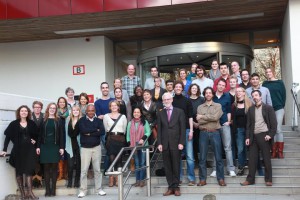There is only little empirical research on the quality of incompany training projects provided by external training companies. In the late 1990s a group of training companies commissioned research into this. A standardized questionnaire was developed and completed by internal training project commissioners. Continue reading Quality of in-company training projects: the power is in the preparation
Author: mmulder
Martin Mulder is Emeritus Professor of Education and Director-Owner of MM Consultancy for Education and Training. He published widely with his colleagues and students about issue related to competence development, vocational and professional education, higher education, teacher education, and learning technology.
Visiting Professorship at Toulouse Business School
Martin Mulder is Visiting Professor at Toulouse Business School. He is also a member of the Scientific Committee of the International conference on Skills for the Future – Training, employment, occupations and employability in turbulent times, which will be held in Toulouse, France, on 18-19 September 2014. The deadline for submitting paper proposals (500) is April 30, 2014. For further information: see http://www.tbs-education.fr/en/research-faculty/international-conference-skills-future
.
Martin Mulder in Academic Board of NCOI
Martin Mulder is appointed in the Academic Board of NCOI (www.ncoi.nl). NCOI is the leading training and education organization in the private sector in the Netherlands. Mulder will be active in the research domain ‘Education’. In this domain Lector Dr Loes Houweling is working for the Master Special Education Needs (Master SEN) and Lector Dr Martijn van Schaik for the Masters Educational Science (Master Onderwijskunde), and Education and Development (Master Learning & Development). See further: http://www.ncoi-onderzoeksinstituut.nl/over-ons/academic-board/prof-dr-martin-mulder.html and http://www.ncoi-onderzoeksinstituut.nl/opleidingen/master-onderwijskunde.html. Mulder can utilize his expertise in educational practice, research and management in this position.
New article in press on entrepreneurship among small business ownermanagers
Lans, T., M.A. van Galen, J.A.A.M. Verstegen, H.J.A. Biemans and M. Mulder (2014). Searching for entrepreneurs among small business ownermanagers in agriculture. In: NJAS – Wageningen Journal of Life Sciences. Download from http://www.sciencedirect.com/science/article/pii/S1573521413000687
Mark article history: Received 8 June 2009; Received in revised form 21 July 2011; Accepted 3 December 2013; Published: 2014.
Continue reading New article in press on entrepreneurship among small business ownermanagers
Culturally diversified dyads in a computer-supported collaborative learning environment by Vitaliy Popov et al published online in Computers in Human Behavior.
The ECS article below is published online in Computers in Human Behavior as:
Vitaliy Popov, Omid Noroozi, Jennifer B. Barrett, Harm J.A. Biemans, Stephanie D. Teasley, Bert Slof, Martin Mulder (2014). Perceptions and experiences of, and outcomes for, university students in culturally diversified dyads in a computer-supported collaborative learning environment. Computers in Human Behavior, Volume 32, March 2014, Pages 186–200.
‘Abstract
The introduction of computer-supported collaborative learning (CSCL), specifically into intercultural learning environments, mirrors the largely internet-based and intercultural workplace of many professionals. This paper utilized a mixed methods approach to examine differences between students’ perceptions of collaborative learning, their reported learning experiences, and learning outcomes when they collaborated in a CSCL environment working with a culturally similar or dissimilar partner. Culturally diverse student dyads worked together to perform an online learning task in the domain of life sciences. Our sample of 120 BSc and MSc students was comprised of 56 Dutch and 64 international students, representing 26 countries. The results showed that students from an individualist cultural background had a more negative perception of collaborative learning than did students with a collectivist background, regardless of group composition. For women, working in a culturally similar dyad consisting of students from an individualist cultural background resulted in a more negative perception of collaborative learning than did working in this type of group for men or women working in a culturally similar dyad consisting of students from a collectivist cultural background. Students from an individualist cultural background achieved better learning outcomes than did students with a collectivist background, regardless of group composition. These findings suggest that cultural background adds an important dimension to collaborative learning, which requires students to manage collaboration that is not only virtual but also intercultural.’
Abstract copied from original publication as published in Computers in Human Behavior’.
Happy New Year!!!
Happy New Year
to all of the
34.000 unique visitors
of this website in 2013, who collectively visited over
400.000 pages
and who accounted for over
500.000 hits
to the website.
Many thanks for your interest!
Looking forward to seeing you again this year,
although I do not track visitors 🙂
Feel free to use what you like.
Merry Christmas and a Happy New Year
Impressions of the 3rd WBREN conference in Novi Sad
In the week of November 25 the 3rd and last conference was held of the Tempus project ‘Western Balkans Rural Extension Network’. The conference was held in Novi Sad in Serbia. The project achieved various results, amongst which modules for a Master Specialization on Rural Development, and a network of informal training organizations, which want to proceed with a new application for further cooperation. Thanks to the partners, for a wonderful series of activities and events. Enjoy some pictures of the delegates who were present at the conference.
Continue reading Impressions of the 3rd WBREN conference in Novi Sad
Wageningen University best university of the Netherlands – for the 9th time
Wageningen University is again chosen by the Choice Guide Higher Education 2014 as the best university of the Netherlands, for the 9th year in a row. Many study programmes rank number in 1 in their field in the Netherlands. The program Plant Sciences received 98 out of 100 points. The Choice Guide praises the interesting study programs, intensive supervision and coaching and fine facilities. Congratulations.
Self-directed lifelong learning in hybrid learning configurations
The article ‘Self-directed lifelong learning in hybrid learning configurations’, by P. H.M. Cremers, A.E.J. Wals, R. Wesselink, N. Nieveen and M. Mulder (2013), in the International Journal of Lifelong Education appeared and is available at http://www.tandfonline.com/doi/full/10.1080/02601370.2013.838704 In the article, an attempt was made to generate design guidelines for a learning environment in which higher education and workplace learning were combined.

